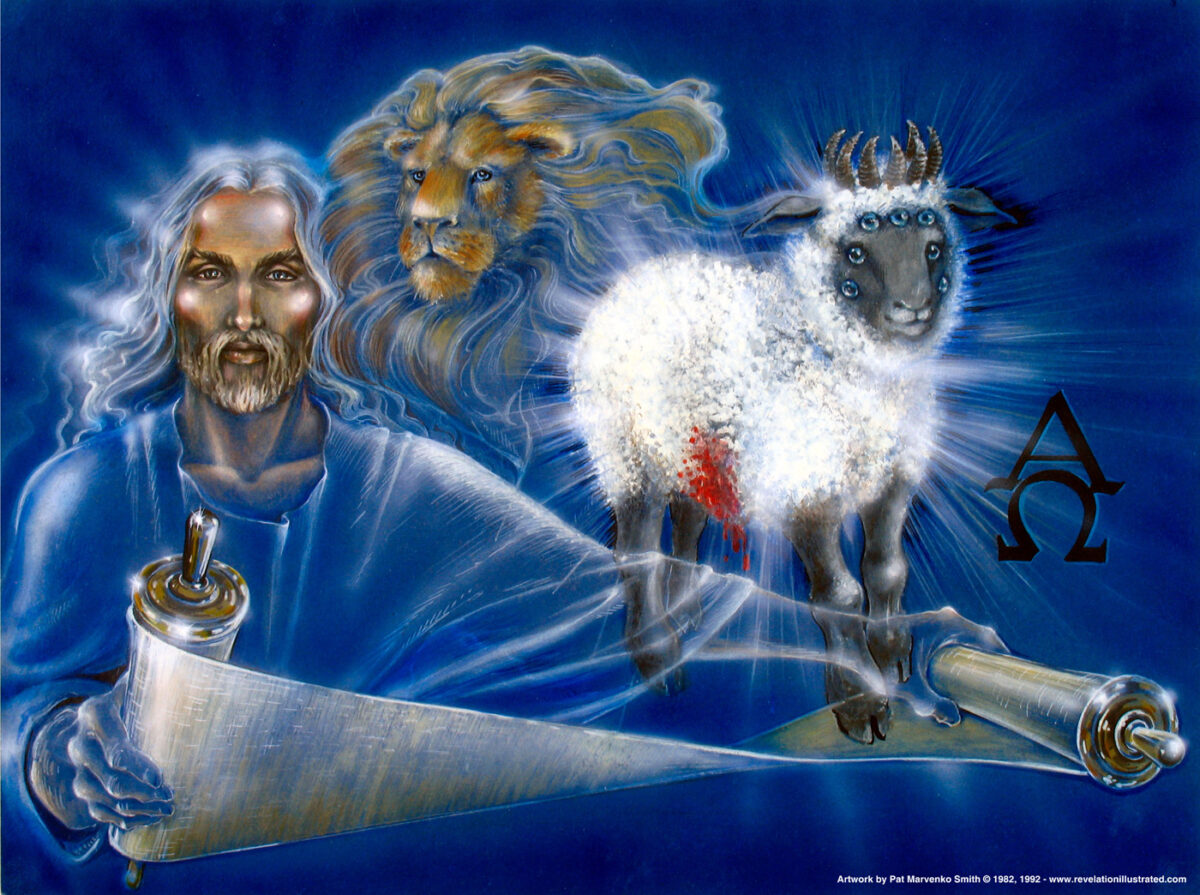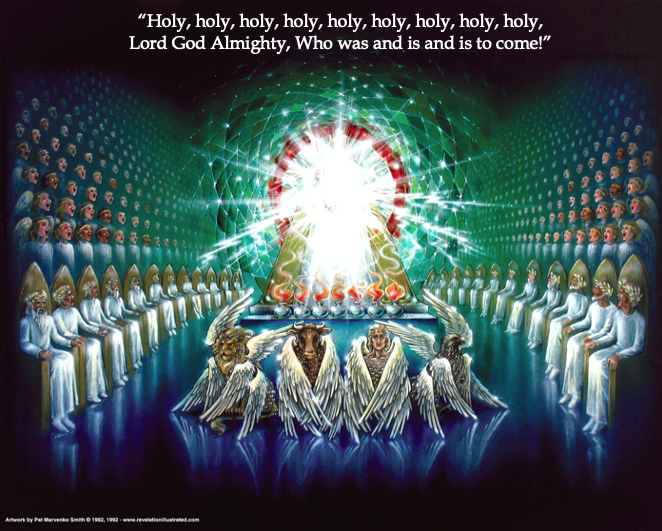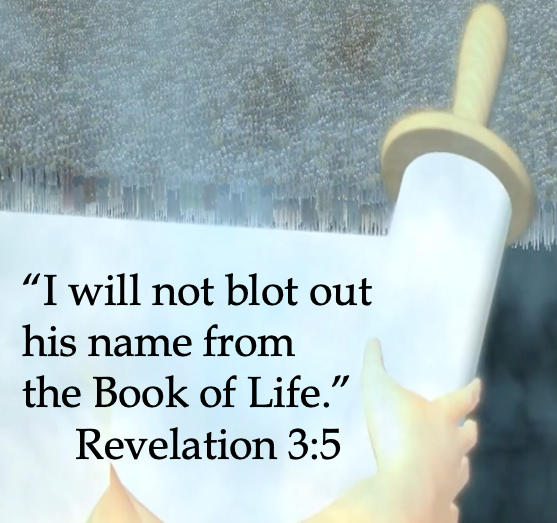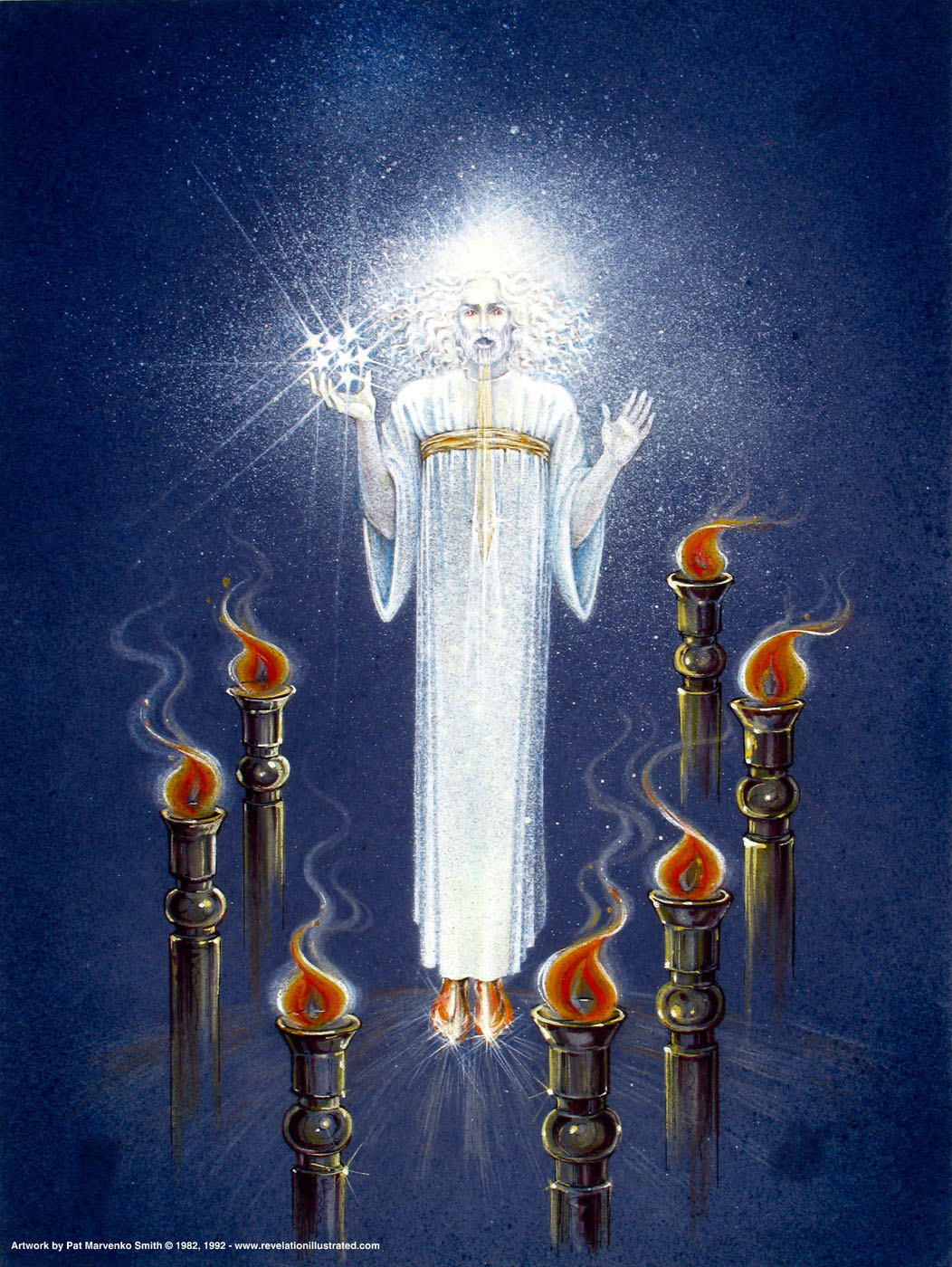“After these things I looked, and behold, a great multitude which no one could number, of all nations, tribes, peoples, and tongues, standing before the throne and before the Lamb, clothed with white robes, with palm branches in their hands.” Revelation 7:9
During the interlude between the sixth and seventh seal judgments, the apostle John receives two visions of God’s great mercy involving the salvation and sealing of 144,000 Jews on the earth (7:1-8) and the salvation of Gentiles and Jews from every nation who are taken to heaven (7:9-17). Even though this will be a time of trouble on the earth like never before, it will also be a time of salvation like never before—of both Jews (7:1-8) and Gentiles (7:9-17). 1
I often hear a certain religious group responding to our online videos who claim that there will only be 144,000 people in heaven. 2 Some scholars believe the 144,000 on the earth (7:1-8) are the same group mentioned in heaven (7:9-17). 3 But this is contrary to what we see in Revelation 7. There are significant differences between the redeemed group of 144,000 on the earth (7:1-8) and the redeemed group of people before God’s throne in heaven (7:9-17): 4
1. The number of redeemed on the earth is not only smaller, but definite (“one hundred and forty-four thousand” – 7:4), but the number of redeemed in heaven is not only larger, but indefinite (“a great multitude which no one could number” – 7:9).
2. People from “all the tribes of the children of Israel” comprise the first group (7:4), but people from “all nations, tribes, peoples, and tongues” make up the second (7:9).
3. The first group is standing on “the earth” (7:1-3), whereas the second group is standing “before the throne” of God in heaven (7:9).
4. God prepares the first group for imminent peril on the earth (“Do not harm the earth, the sea, or the trees till we have sealed the servants of our God on their foreheads” – 7:3), but the second group is victorious, secure, and at rest in heaven (“standing before the throne and before the Lamb, clothed with white robes, with palm branches in their hands” – 7:9).
5. The first group is prepared for persecution on the earth (7:1-8), but the second group is ascended to heaven after persecution (7:14-15).
There seems to be a cause-and-effect relationship in Revelation 7between the 144,000 Jewish believers in verses 1-8 and the innumerable crowd of Gentile believers in verses 9-17. The ministry of the 144,000 during the last half of the Tribulation period brings about salvation for millions of people. 5 In spite of the turmoil all around them, the 144,000 Jewish evangelists are faithful to God and God uses them to reach many people from all over the earth during the last half of the Tribulation period (cf. Matthew 24:14). 6
Some students of the Bible have concluded that those who heard the gospel before the Rapture of the Church and rejected it, will not be able to get saved during the Tribulation. They refer to 2 Thessalonians 2:9-12 for support of this view. “9 The coming of the lawless one is according to the working of Satan, with all power, signs, and lying wonders, 10 and with all unrighteous deception among those who perish, because they did not receive the love of the truth, that they might be saved. 11 And for this reason God will send them strong delusion, that they should believe the lie, 12 that they all may be condemned who did not believe the truth but had pleasure in unrighteousness.” (2 Thessalonians 2:9-12).
When Paul speaks of being “saved” (2:10), he is speaking of the salvation or deliverance from the Tribulation on earth by means of the Rapture of the church as seen elsewhere in his letters to the Thessalonians (cf. I Thessalonians 1:10; 4:13-5:11; 2 Thessalonians 2:1). 7 Verse 12 does not mean that everyone alive at the time of the Rapture who are unbelievers will be given God’s “strong delusion” and be unable to get saved during the Tribulation.
Seemingly when the Rapture occurs the Man of Sin will emerge and will give some explanation for the sudden disappearance of Christians. With this lie will surely come his claim to be God and to offer protection for all who follow him. Many will be deceived by his message. It is not known for sure what the strong delusion will be. But it is known that only unbelievers who did not “believe the truth but had pleasure in unrighteousness” will be deceived (2:12). This cannot mean that all the unsaved when the Rapture occurs will be eternally condemned since Revelation 7 states that there will be 144,000 Jewish evangelists who will lead innumerable Jews and Gentiles all over the earth to faith in Christ during the Tribulation. 8
Those who had “pleasure in unrighteousness” are people who heard and yet rejected the gospel in this Church Age. Those in tribes and people groups who have not heard the gospel will not be endangered by this delusion. It is possible that some in countries like the United States, where the gospel is accessible to all, will not have heard the clear gospel, or have not heard it enough, and so some of them will come to faith in Christ during the Tribulation. Likely, however, many people in Christian lands will be deluded when the Rapture occurs and will be hardened in unbelief. Most of the converts of the 144,000 will likely be in third-world countries and unreached areas of the world (Matthew 24:14). 9
This is a powerful reminder for unbelievers not to continue in their unbelief. They are to cry out to God to show them the truth. Their fear of the coming Tribulation is meant by God to motivate them to ask Him to reveal the truth of the gospel to them. 10 During the Tribulation it will be very difficult for those who have continually rejected the gospel to come to faith in Christ. “After all, it won’t get easier to be a Christian after the Rapture, but rather more difficult, since the Antichrist will openly persecute those who receive Christ and refuse to take his mark (Revelation 13:7, 16-17). However, to say that it is impossible for anyone to receive God’s mercy during the Tribulation is expanding 2 Thessalonians 2:9-12 beyond what the context allows.” 11
Let’s take a closer look now at this second group in heaven. The apostle John writes, “After these things I looked, and behold, a great multitude which no one could number, of all nations, tribes, peoples, and tongues, standing before the throne and before the Lamb, clothed with white robes, with palm branches in their hands.” (Revelation 7:9). The converts of the 144,000 are from “all nations, tribes, peoples, and tongues.” Every country, tribe, people-group, and language group will be represented in heaven. This tells us that racial distinctions and uniqueness are retained in eternity. 12
Only Jesus Christ can unite all nations and ethnicities together for all of eternity! Governments, special interest groups, and well-meaning religious groups have failed to bring universal peace to the nations of the world. However, God is at work amid a world that is divided. There are churches today comprised of various ethnicities worshiping the true God, Jesus Christ (I John 5:20)! This is a preview of more to come throughout eternity.
These converts of the 144,000 will be “clothed with white robes.” These “white robes” represent believers in Jesus who have been declared righteous in the sight of God through faith in Christ. One of the twenty-four elders says of this group, “These are the ones who come out of the great tribulation, and washed their robes and made them white in the blood of the Lamb.” (Revelation 7:14). Whereas the white robes in Revelation 3:4-5 are an eternal reward given to believers who remain faithful to Christ until they go to heaven, the robes here in 7:9, 14 are symbolic of the complete and eternal cleansing of sin that comes to every person who believes in Christ for eternal life. 13
These believers standing before the thrones of God the Father and God the Son are holding “palm branches in their hands” (7:9), which recalls “John 12:13 where the Jews meet Christ at His triumphal entry into Jerusalem with joyful celebration and exalt Him as Israel’s King. (The Jews celebrated the Feast of Tabernacles by waving palm branches as they quoted Psalm 118:25-26.) In a similar manner the redeemed ones before the throne will celebrate the imminent victory of the King at His Second Advent (cf. 19:11–20:3) as well as His coming reign (cf. 20:4).” 14
This innumerable group of redeemed people are, “crying out with a loud voice, saying, ‘Salvation belongs to our God who sits on the throne, and to the Lamb!’” (Revelation 7:10). The word for “salvation” (sōtēria) here refers to a two-fold deliverance: first, from the Lake of Fire as seen in verse 14 where reference is made to the eternal cleansing of the blood of the Lamb. And secondly, when Christ returns to the earth there will be a deliverance from the Man of Sin (cf. Micah 5:6; 2 Thessalonians 2:8; Revelation 19:15-20), physical corruption (cf. Romans 8:21-22; Isaiah 35), and the rebellion of men (cf. Psalm 2:9; Jeremiah 30:23-24; Revelation 19:11-21). 15
Verse 10 underscores that this salvation or deliverance belongs to God the Father(“our God who sits on the throne”)and God the Son(“to the Lamb”). Only God could pay the penalty for all our sins since it took a perfect sacrifice to accomplish such a feat (Hebrews 1:8; 10:1-14). And only God could overcome centuries of sin and death through His return to earth to set up His kingdom and bring universal peace and blessings to the earth (Revelation 11:15-18; 19:11-20:6; cf. Isaiah 11:1-16; 65:17-25).
In addition to these martyred Tribulation believers (7:14) shouting praises to God the Father and God the Son, John tells us, “All the angels stood around the throne and the elders and the four living creatures, and fell on their faces before the throne and worshiped God.” (Revelation 7:11). Other “angels,” in addition to the four living creatures and the twenty-four elders, representing the church, “stood around the throne and worshiped God.” While the earth is subject to wrath at this time, heaven is filled with worship of God the Father and God the Son.
All the inhabitants of heaven are saying, “Amen! Blessing and glory and wisdom, thanksgiving and honor and power and might, be to our God forever and ever. Amen.” (Revelation 7:12). “Blessing” (eulogia) or praise is what God deserves because of what He will do for these people (cf. Revelation 5:12, 13). 16 “Glory” (doxa) is the honor due to God because of His good reputation, specifically for delivering them (cf. Revelation 1:6; 4:11; 5:12, 13; 19:1). 17 “Wisdom” (sophia) is God’s infinite knowledge displayed in His plan of deliverance (cf. Revelation 5:12). “Thanksgiving” (eucharistia) literally means “well” and “to give freely,” but it denotes an expression of gratitude for a favor rendered (cf. Revelation 4:9). 18
“Honor” (timē) or esteem is what God deserves because He has planned and provided this salvation (cf. Revelation 4:11; 5:12, 13). 19 “Power” (dynamis) reflects God’s omnipotence that enables Him to overcome all opposition (cf. Revelation 4:11; 5:12; 19:1). 20 “Might” (ischys) or strength refers to God’s inherent power that enabled Him to deliver this multitude from their enemies (5:12). 21 God is worthy of this worship throughout eternity. “Amen” (Amēn) underlines the truthfulness of this sevenfold ascription (cf. 5:13). 22
We must not overlook the oneness of God the Father and God the Son in these verses. While their worship is directed to both God the Father and God the Lamb, we are told they “worshiped God” (7:11) and gave praise “to our God” (7:12). During His earthly ministry Jesus said, “For the Father judges no one, but has committed all judgment to the Son.” (John 5:22). The Jews thought it was God alone who would judge the world, but Jesus claims that the Father has given Him that privilege. Why? “That all should honor the Son just as they honor the Father. He who does not honor the Son does not honor the Father who sent Him.” (John 5:23). The Jews believed that only God was to be honored and worshiped. Jesus claims the same right to be worshiped and honored that the Father has. This emphasizes the unity of the Father and the Son. What is done to One, is also done to the other because they are equals. They both have the same divine nature.
This is why all other religions fall short. They cannot truly honor God or worship Him apart from Jesus Christ. This is why Islam, Buddhism, Hinduism, Mormonism, Jehovah Witnesses, etc., all fall short because they do not worship and honor God the Father through Jesus Christ. They may say Jesus was a god or a prophet or a good moral teacher, but they do not believe He is the one true God. And by rejecting Jesus Christ as God, they are rejecting His Father because Christ is the perfect reflection of the Father.
But this will not happen in heaven. All the inhabitants of heaven will honor and worship both God the Father and God the Son because they understand the oneness of God. Jesus said, “baptizing them in the name of the Father and of the Son and of the Holy Spirit” (Matthew 28:19b). Jesus taught that God is one (“the name” is singular) in divine nature, yet eternally exists in three Persons (“Father… Son… Holy Spirit”) Who are equal in every way, yet distinct in their tasks and relations to humanity. God is one substance (Deuteronomy 6:4), yet three in Person (Ephesians 2:18; 2 Corinthians 13:14). Students of the Bible refer to this truth as the Trinity or “three in one.”
All three Persons in Matthew 28:19 share one “name,” because they are one Being. This is not self-contradiction, and here is why: Person is not the same as being. Your being is the quality that makes you what you are, but your person is the quality that makes you who you are. For example, we are humans. That is what we are. That is why we are called human beings. But what we are is not the same as who we are. If someone asks, “Who are you?” I should not respond by saying, “A human!” That answers the question of what I am, not who I am. Who I am is Jeff Ropp; that is my person. What I am is a human; that is my being. Being and person are separate.
Unlike a human being, which has only one person, God has three Persons. He is one being, Yahweh, in three persons: Father, Son, and Holy Spirit. Unlike a human being, which has only one person, God has three persons. He is one being, Yahweh, in three persons: Father, Son, and Spirit. He is more than able to exist like that because He is God. If we say God must have only one Person, like humans, then we are making God in our image. Who are we to limit God? It is up to God to tell us Who He is. That is where the discussion should really be between Christians and non-Christians: on revelation, not on the conceptual plane of “Trinity versus _______,” as if our reason alone can dictate or even decipher the nature of God.
Christians and non-Christians should agree that God is greater than we can possibly conceive, more complex than we could ever hope to grasp. We are in no position to determine the intricacies of God’s nature. If God were to inform us that He is one being in one Person, we are obligated to believe Him. If He tells us, “I am one being in three Persons,” who are we to say “No” to God? As believers in revelation, we must turn to divine Scripture to learn about God.
Scripture is the reason why Christians believe God is triune. The doctrine of the Trinity is the best interpretation of the Bible. There are five elements found repeatedly throughout the Bible’s text that are best interpreted through the lens of the Trinity:
– There is only one God (e.g., Romans 3:30)
– The Father is God (e.g., John 6:27)
– Jesus is God (e.g., John 20:28; Romans 9:5; 2 Peter 1:1)
– The Holy Spirit is God (e.g., Acts 5:3–5)
– These three are distinct Persons (e.g., John 14:16–17)
Those who reject this biblical truth of the Trinity, cannot worship God in the way He has revealed in His holy Word, the Bible. They can change their minds now and believe in Jesus alone for His gift of eternal life (John 3:36a) and worship the Triune God “on earth” and “in heaven” forever (Revelation 5:13; cf. Philippians 2:9-11). But if they refuse to believe Jesus Christ for His gift of eternal life, God’s wrath “abides on him” or her forever (John 3:36b) and they will bow down before Jesus as their Lord “under the earth” in the lake of fire (Revelation 5:13; 20:15; cf. Philippians 2:9-11).
As we looked upon the inhabitants of heaven during the Tribulation on earth, we saw an innumerable gathering of people before the throne of God consisting of Jews and Gentiles from the church age (“twenty-four elders”) and the Tribulation (7:9, 14). What part of this great multitude of people in heaven will be there because of you and me? Because we were faithful to preach the gospel of Jesus Christ (Mark 16:15) and make disciples of those who believed in Christ (Matthew 28:19-20)?
Prayer: Heavenly Father, thank You for revealing Your great mercy during this unprecedented time of judgment on the earth. Thank You that by believing in Jesus we can be a part of this innumerable gathering of people worshiping You and Your Son around Your throne in heaven forever. We praise Your name and thank You that Israel will finally fulfill their covenant promise – to be a light to the Gentiles and to proclaim the gospel of the kingdom throughout the world during the last half of the Tribulation period. Thank You that by Your grace, we can also invest in helping to populate heaven by sharing the gospel with the lost and making disciples of those who believe in Christ during what time we have left on the earth. Please lead us to the people Your Spirit has prepared to hear and believe the gospel so we may share it with them. All blessing and glory and wisdom, thanksgiving and honor and power and might belong to You both now and forever, O Lord God. In the matchless name of the Lord Jesus Christ, we pray. Amen.
ENDNOTES:
1. Bob Vacendak; Robert Wilkin; J. Bond; Gary Derickson; Brad Doskocil; Zane Hodges; Dwight Hunt; Shawn Leach. The Grace New Testament Commentary: Revised Edition (Grace Evangelical Society, Kindle Edition, 2019), pp. 1524-1525.
2. Jehovah Witnesses are the most common responders who adhere to this view.
3. Tom Constable, Notes on Revelation, 2017 Edition, pg. 99 cites as an example Gregory K. Beale, The Book of Revelation: A Commentary on the Greek Text, The New International Greek Testament Commentary series (Grand Rapids: Wm. B. Eerdmans Publishing Co., and Carlisle, England: Paternoster Press, 1999), pg. 424; George Eldon Ladd, A Commentary on the Revelation of John (Grand Rapids: Eerdmans, 1972), pg. 116.
4. Adapted from Constable, pg. 99 and Charles R. Swindoll, Insights on Revelation, (Swindoll’s Living Insights New Testament Commentary Book 15, Tyndale House Publishers, Inc., 2014 Kindle Edition), pg. 167.
5. Mark Hitchcock, The End: A Complete Overview of Bible Prophecy and the End of Days (Carol Stream, IL: Tyndale House Publishers, Inc., 2012 Kindle Edition), pp. 291-291.
6. Bob Vacendak; Robert Wilkin; J. Bond; Gary Derickson; Brad Doskocil; Zane Hodges; Dwight Hunt; Shawn Leach. The Grace New Testament Commentary: Revised Edition (Grace Evangelical Society, Kindle Edition, 2019), pg. 1526.
7. Robert Wilkin; J. Bond; Gary Derickson; Brad Doskocil; Zane Hodges; Dwight Hunt; Shawn Leach. The Grace New Testament Commentary: Revised Edition (Grace Evangelical Society, Kindle Edition, 2019), pg. 1149.
8. Ibid., pg. 1150.
9. Ibid.
10. Ibid.
11. Hitchcock, pg. 244.
12. Tony Evans, CSB Bibles by Holman, The Tony Evans Bible Commentary (B & H Publishing Group, Kindle Edition, 2019), pg. 2384.
13. Vacendak, pg. 1526.
14. Ibid.
15. Ibid.
16. Constable, pg. 100.
17. Ibid., cites W. E. Vine, An Expository Dictionary of New Testament Words, (Old Tappan, N.J.: Fleming H. Revell, 1966), pg. 158.
18. Ibid., cites George Abbott-Smith, A Manual Greek Lexicon of the New Testament, (Edinburgh: T. & T. Clark, 1950), pg. 190.
19. Ibid., cites F. C. Jennings, Studies in Revelation, (New York: Publication Office of “Our Hope,” n.d.), pg. 230.
20. Ibid.
21. Ibid., cites Robert L. Thomas, Revelation 1—7, (Chicago: Moody Press, 1992), pp. 491-92.
22. Ibid.
23. The last few paragraphs are adapted from former Muslim, Nabeel Qureshi’s book No God but One: Allah or Jesus? (Grand Rapids: Zondervan, 2016 Kindle Edition), pp. 55-57.








